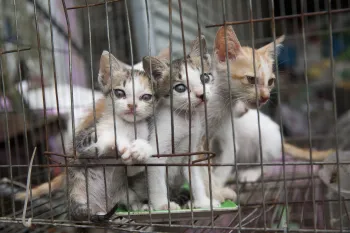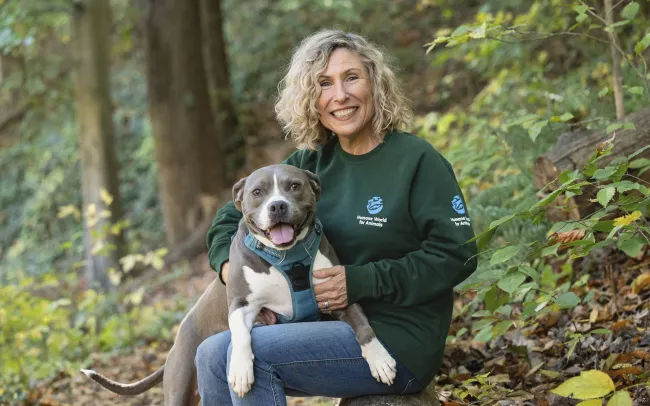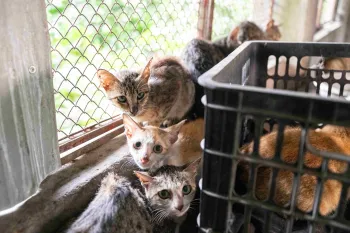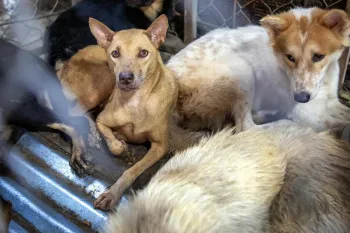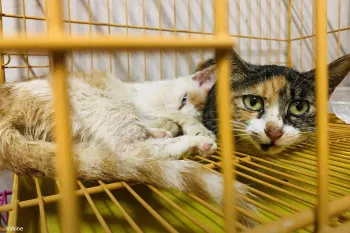For the past five years, Pham Quoc Doanh has been making his living by running a cat meat restaurant and slaughterhouse in Thai Nguyen, Viet Nam. But the work has weighed heavily on him, especially since he knew that many of the cats brought to him by cat meat traders were stolen pets. He decided to take action.
Mr. Doanh reached out to our Humane Society International team in Viet Nam for help to close his business, which drowned up to 300 cats each month, for good. With a one-time grant we provided, Mr. Doanh is setting up a grocery store.
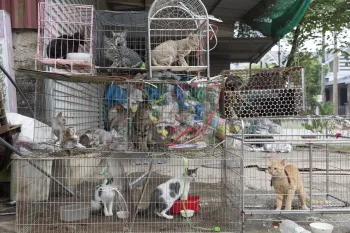
Chau Doan/AP Images for HSI
Twenty cats and kittens who were next in line to be drowned for the restaurant have now been saved. We removed the cats from the property on the final day of business and watched as Mr. Doanh tore down the restaurant’s “cat meat” signage.
“It makes me happy to know that thanks to HSI, my wife and I can now put the cat meat trade behind us,” Mr. Doanh said. “I want to see a ban on the dog and cat meat trade in Viet Nam.”
Mr. Doanh is not alone: A recent Nielsen opinion poll commissioned by HSI shows that cat meat is consumed by a minority of the Vietnamese population (21%), and that a majority (71%) favors of a ban on cat meat consumption and trade. Yet the trade continues: An estimated 1 million cats are killed for meat each year in Viet Nam. Traders set spring-loaded snare traps with food as bait to lure cats who are pets and strays. Polls reveal how prevalent this is: 87% of people in Viet Nam have either had a pet stolen or know someone whose pet has been stolen.
The closure of Mr. Doanh’s business and the rescue of the cats is part of our Viet Nam Models for Change program, launched in the country last year after successfully operating in South Korea since 2015. South Korea recently announced a plan to phase out dog meat in the country by 2027.
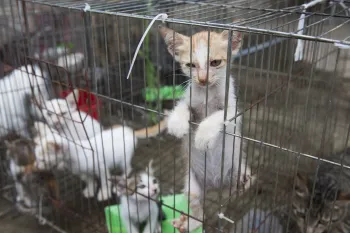
Chau Doan/AP Images for HSI
All 20 cats rescued from Mr. Doanh’s slaughterhouse were taken to custom-made sheltering at Thai Nguyen University of Agriculture and Forestry. They received rabies vaccines and are currently getting veterinary care and recovering before going up for adoption. At the university, our team is also providing a training for veterinary students in shelter medicine, cat behavior and spay/neuter procedures, helping to build local capacity for improving feline welfare at a larger scale.
Years ago, it seemed like there was hope in bringing the cat meat trade to an end in Viet Nam: In 1998, the prime minister issued a directive banning the hunting, slaughtering and consumption of cats in order to help control the rodent population. But little action was taken to combat the trade, and the directive was eventually repealed in 2020. We hope that the success our Models for Change program has had in changing hearts and minds in South Korea may continue to be replicated in Viet Nam.
Follow Kitty Block @HSUSKittyBlock.
